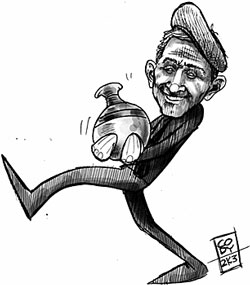
Illustration by Cody Angell
|
By Phil Leckman
Arizona Daily Wildcat
Monday April 21, 2003
The land now called Iraq is no stranger to conquest. By some reckonings, the world's first empires arose on these fertile lands between the Tigris and Euphrates rivers, and since then, dozens of conquerors ÷ from the Assyrians, Persians, Greeks and Mongols to the Turks and, most recently, the British ÷ have left their marks on Iraq's long history.
Given this long list of foreign masters, it is easy to understand the skepticism many Iraqi people display when they hear the generals and politicians of the United States ÷ their latest conquerors ÷ claim their only goal is a quick transition to a better, freer Iraq. In a land whose legacy of tyrants and despots was already thousands of years old when the United States was just a gleam in Thomas Jefferson's eye, actions speak much louder than words. And on that count, the United States has done little to reassure Iraqis of its motives.
For archaeologists like myself, few recent events display America's disregard for Iraqi culture more glaringly than the looting of the Iraqi National Museum. The chief repository for all antiquities excavated in the country since 1920, the museum was stripped of most of its 170,000 artifacts, including many that dated back thousands of years.
In Iraq, as in many other countries, the past has become a key part of national ideology. Ancient artifacts are more than simply records of a nation's past or its heritage; they are the stuff from which such a heritage is constructed. As such, they can become important social and political symbols. The looting of the museum is therefore more than an assault on an irreplaceable archaeological and historical resource. In many ways, it is an attack on Iraqi national identity itself.
As art historian Zainab Bahrani wrote recently, the archaeology of Mesopotamia ÷ a name often applied to ancient Iraq ÷ has played a key role in the politics of the region from the time it began to be uncovered in the late 19th and early 20th centuries. Because of its importance, the Western archaeologists who excavated it took Iraq's heritage and in effect tried to make it their own. "Protecting" the archaeology of Iraq became part of the argument used by the British to justify their colonial rule of the country.
As a result, reclaiming title to the Mesopotamian past formed a major preoccupation for Iraq's rulers after independence. Iraqi national identity became inextricably linked with its ancient civilizations. Images from ancient artifacts featured prominently in official propaganda and government art. Archaeological sites like Babylon were restored and became major tourist attractions. Ancient leaders like Nebuchadnezzar and Hammurabi were raised to the status of national heroes.
As evidence mounts that many artifacts in the museum were stolen at the request of international art dealers, many Iraqis will interpret the looting as little more than a repeat of colonialism's worst abuses. Indeed, some in the Western press have even applauded the looting, repeating offensive imperialist arguments about "protecting" Iraqi archaeology almost word-for-word.
The attack on the Iraqi museum could have been prevented ÷ the Society for American Archaeology and many other international observers foresaw the looting and asked the military to protect the museum and other cultural resources before the war even began. As UA anthropology graduate student Marcy Rockman remarked to me in an e-mail discussion last week, protecting the museum could have been "a shining example," proof that the Bush administration's quarrel was with the Iraqi regime only ÷ "not the people of Iraq or the identity of the country, not just a bid for its oil." But U.S. leaders were apparently indifferent. And for many Iraqis, the results will only confirm their worst suspicions about American motives.
Other UA anthropologists and archaeologists voiced similar opinions. Graduate student Laura Eichelberger noted that even before the war, many Arab intellectuals were already viewing the potential conflict as the latest chapter in a long European humiliation of the people of the Middle East ÷ permitting the pillaging of Iraq's cultural heritage certainly does little to change this view.
Indeed, few recent events will reassure skeptics that U.S. intentions are any different than the colonizers and imperialists of the past. In the last few days, American troops have installed would-be Iraqi leader Ahmed Chalabi ÷ an exile who hasn't lived in the country in 50 years ÷ in Baghdad, complete with a personal, U.S.-equipped army. Fat redevelopment contracts have been handed out to huge U.S. construction firms with close ties to the Bush government. And the U.S. military has announced its intention to maintain at least four bases in Iraq for years to come.
These are the actions of conquerors, not liberators. Perhaps, then, the plundering of Iraq's cultural riches is an appropriate symbol for "Operation Iraqi Freedom" ÷ as anthropology graduate student Bruce Bachand remarked to me, "there is nothing new about pillaging, desecration, or the appropriation of old things." Such events have always marked the expansion of empires.

